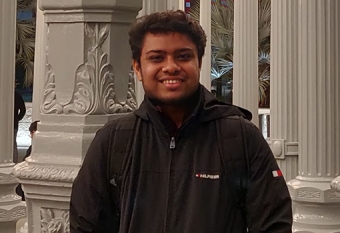
Chemical engineering faculty have awarded Parth Shah the department’s top honor for a rising third-year PhD student, the prestigious Dow Discovery Fellowship. The department awards one each year to a student who has made outstanding strides in research and presents a compelling plan for a creative new high-risk, high-reward project.
“I feel extremely lucky, and I am delighted to be selected. I know the other applicants were equally deserving,” said Shah, who is advised by Professor Todd Squires. “I believe this fellowship will provide me with the freedom to pursue the fascinating research ideas that I proposed in the most compelling directions.”
The Squires group investigates a range of topics in micro-scale fluid mechanics and transport science, both experimentally and theoretically. They use microfluidic systems for manipulation of charged particles in fluid environments, and the conceptual design of structured, formulated fluids.
“Parth is such an enthusiastic researcher, brimming with ideas and excitement,” said Squires. “Even though labs have opened in a limited way, he’s been so productive, creative, and happy to be back to his project. With students like Parth, it’s best to give them support and guidance, and then let them blaze their own trail. I’m really looking forward to playing my part in Parth’s journey.”
Shah’s research proposal, “Self-Propelling Particles: A New Paradigm for Targeted Delivery,” focuses on developing strategies for targeted delivery in dead-end pores by using self-propelling particles (SPP). Dead-end pores are areas in a porous medium where advective and diffusive characteristics are affected within the “dead zone.” His project seeks to overcome challenges associated with dead-end pores and SPP, which convert chemical energy from the environment into mechanical motion.
“We propose external electrolyte gradients can “steer” the self-propelling particles to their desired targets,” said Shah, who received his bachelor’s degree in chemical engineering from the Institute of Chemical Technology in Mumbai, India. “We also envision a mechanism that will allow particles to self-propel in varied environments. More broadly, we want to develop a conceptual framework for the modular design of self-propelling particles for targeted delivery applications.”
Shah says the potential rewards of designing and using self-propelling particles for autonomous and targeted delivery are substantial.
“Applications include drug delivery, oil recovery, lab-on-chip devices for sensing and diagnosis because they all require colloids to be delivered to a desired target and can benefit from a conceptual framework,” said Shah, whose Dow Fellowship will run from 2020 through 2023. “Design principles can also be used to manipulate and develop smart, dynamic materials based on self-propelling particles.”
“I love the idea of discovering and demonstrating basic strategies to accomplish pretty incredible tasks like this and feel like Parth has a great handle on how to go about it,” added Squires. “This plays into other projects my group has been pursuing, largely with the support from industrial partners. What is particularly nice here is that Parth will be able to pursue this project without having to constrain his focus to a particular application space, and so hopefully, it will broaden his impact on science and technology more generally.”
The fellowship is made possible by a generous contribution from the Dow Chemical Company. The three-year, $150,000 fellowship is designed to support students over the remaining three years of their graduate work. Previous Dow Discovery fellowship recipients include Preshit Dandekar, Nikola Petsev, Richard Hermann, St. Elmo Wilken, and Nick Sherck.



